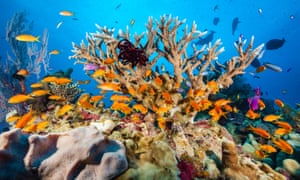Emails tabled in Senate inquiry recommended ‘trade-offs’ to Great Barrier Reef Foundation
Great Barrier Reef scientists were told they would need to make “trade-offs” to the Great Barrier Reef
Foundation, including focusing on projects that would look good for the
government and encourage more corporate donations, emails tabled in the
Senate reveal.
The documents, including cabinet briefing notes, contain significant new details about the workings of the foundation and the government decision to award it a $443m grant, including:
“Where it becomes challenging is that … interventions with the largest future benefit also take the longest to develop,” the institute’s executive director of strategic policy, David Mead, wrote in an email to colleagues.
“Among other trade-offs, we will need to determine to what degree we focus on quick wins or whether we progress longer-term strategic interventions and accept that we will only partially progress them during the next five years (perhaps with little outward visibility of success/progress).”
The emails also reveal an initial state of uncertainty about how a $100m allocation for reef restoration and adaptation would be handled.
“I followed up with the granting agreement, did not really get an answer other than they are working on it over the next month,” Mead wrote on 18 May. “So we will just have to watch this space.
“Once the thing is signed by GBRF we are going to need them to make some definitive statements one way or the other, as everyone is wondering and I don’t want the team to destruct … ”
Emails between staff at the industry, innovation and science department reveal discussion about the “optics” of a long-planned meeting between Cash, Marsden and the chief executive of institute, Paul Hardisty.
The emails show that the department’s general manager for science agencies governance, Claire McLaughlin, called Cash’s office to ask if she could attend. Her call was returned by a ministerial staffer, Harry Godber.
“Harry Godber just called and said “ … Why is Anna Marsden in it as well?” McLaughlin wrote to colleagues.
“I didn’t have a good answer – assumed it was so they could talk about the reef stuff in whatever configuration – but Harry’s instinct is to not have her there for obvious reasons.”
A senior policy officer at the department, Andrea de Leon Ewers, wrote in a subsequent email that the meeting had been requested by Cash in January, but suggested cancelling and instead providing a briefing to the minister.
“We … were discussing the optics of this meeting and it’s not great, given the way the inquiry is going,” De Leon Ewers wrote.
The documents, including cabinet briefing notes, contain significant new details about the workings of the foundation and the government decision to award it a $443m grant, including:
- The executives of mining, gas and chemicals companies – and international financial houses that actively back fossil-fuel projects – were among the guests at a six-star retreat hosted by the foundation less than a month after the grant was announced;
- The media companies Foxtel and Fairfax and the tech giant Google are among a tightly held list of donors to the foundation;
- The only CSIRO employee contacted about the grant before the announcement in April was in Patagonia, and did not get the email. Documents have previously revealed that the government’s peak science agency was cut out of the decision to award the grant;
- In August, as scrutiny of the grant intensified, public servants pushed to block a long-planned meeting between the then science minister, Michaelia Cash, and the head of the foundation, Anna Marsden, because of concern about the “optics”.
“Where it becomes challenging is that … interventions with the largest future benefit also take the longest to develop,” the institute’s executive director of strategic policy, David Mead, wrote in an email to colleagues.
“Among other trade-offs, we will need to determine to what degree we focus on quick wins or whether we progress longer-term strategic interventions and accept that we will only partially progress them during the next five years (perhaps with little outward visibility of success/progress).”
The emails also reveal an initial state of uncertainty about how a $100m allocation for reef restoration and adaptation would be handled.
“I followed up with the granting agreement, did not really get an answer other than they are working on it over the next month,” Mead wrote on 18 May. “So we will just have to watch this space.
“Once the thing is signed by GBRF we are going to need them to make some definitive statements one way or the other, as everyone is wondering and I don’t want the team to destruct … ”
Emails between staff at the industry, innovation and science department reveal discussion about the “optics” of a long-planned meeting between Cash, Marsden and the chief executive of institute, Paul Hardisty.
The emails show that the department’s general manager for science agencies governance, Claire McLaughlin, called Cash’s office to ask if she could attend. Her call was returned by a ministerial staffer, Harry Godber.
“Harry Godber just called and said “ … Why is Anna Marsden in it as well?” McLaughlin wrote to colleagues.
“I didn’t have a good answer – assumed it was so they could talk about the reef stuff in whatever configuration – but Harry’s instinct is to not have her there for obvious reasons.”
A senior policy officer at the department, Andrea de Leon Ewers, wrote in a subsequent email that the meeting had been requested by Cash in January, but suggested cancelling and instead providing a briefing to the minister.
“We … were discussing the optics of this meeting and it’s not great, given the way the inquiry is going,” De Leon Ewers wrote.

No comments:
Post a Comment